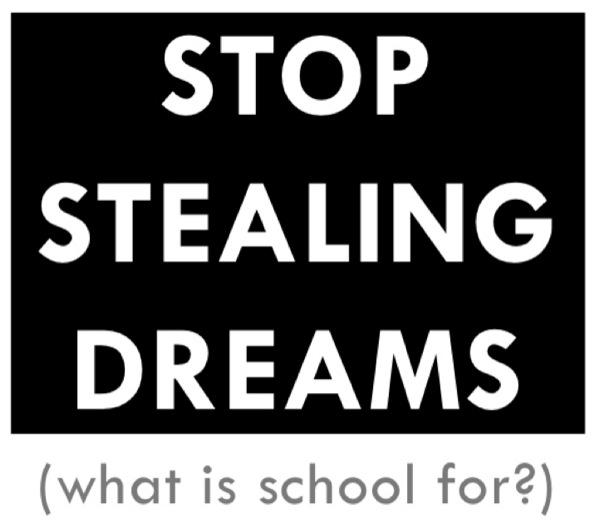In a Wednesday post on website PaidContent , Godin writes that Apple has chosen to not carry his new ebook "Stop Stealing Dreams" in the iBookstore due to number of links in the bibliography that direct readers to Amazon's competing marketplace.
Godin quotes a note he received from Apple as to why the ebook was rejected: "“Multiple links to Amazon (NSDQ: AMZN) store. IE page 35, David Weinberger link.â€
The issue could be cross-promotion as Godin apparently includes his Amazon Affiliate ID with the links in question, allowing the author to receive a small cut of any potential sales, though this matter was not reported as part of Apple's response.
The allegations of content rejection based on the inclusion of out-of-store links have raised the question of whether the practice is actually commercially motivated censorship. Some websites have taken to the story and are airing concerns that Apple's alleged actions might also be adopted by larger online bookstores.
Godin writes:
I think that Amazon and Apple and B&N need to take a deep breath and make a decision on principle: what’s inside the book shouldn’t be of concern to a bookstore with a substantial choke on the marketplace. If it’s legal, they ought to let people read it if they choose to. A small bookstore doesn’t have that obligation, but if they’re seeking to be the one and only, if they have a big share of the market, then they do, particularly if they’re integrating the device into the store. I also think that if any of these companies publish a book, they ought to think really hard before they refuse to let the others sell it.
It is difficult to assess whether Apple is indeed creating a walled marketplace as the iBookstore has yet to reach a marketshare close to its competitors.
Seth Godin's new manifesto discusses the current state of education. | Source: Squidoo
Adding a wrinkle to the sale of ebooks are the pages of content available online in open formats, Godin's newest book included.
Perhaps most troubling to writers are the somewhat vague guidelines as to what will disqualify a book from being sold in the iBookstore. In Godin's case it was a multitude of links, though no stipulation exists as to how many can be included before a book is rejected or if the removal of said links will then qualify the book for sale.
In an attempt to grow its library and corner the education market, Apple released iBooks Author in January to help streamline the process of publishing an ebook through the iBookstore.
The iPad maker's new system was met with some controversy as it seemed licensing rights seemed to restrict the commercial distribution of content created with the new iBooks Author app. The issue was later clarified, however, and Apple revised the agreement to reflect a restriction only applicable to the .ibooks format.
 Mikey Campbell
Mikey Campbell







-m.jpg)






 Charles Martin
Charles Martin
 Marko Zivkovic
Marko Zivkovic
 Andrew Orr
Andrew Orr
 Amber Neely
Amber Neely

 William Gallagher and Mike Wuerthele
William Gallagher and Mike Wuerthele











127 Comments
If you don't like the rules, don't sell your books on the Apple store.
Apple's policy is very clear. If the author chooses to violate it, they shouldn't be whining about Apple dropping their book.
Someone had a good analogy on another site. Would Walmart be happy if you wanted them to sell a book that had a Target gift card taped to the cover? Obviously not - nor should they be.
Something tells me this was done intentionally just to make a stink. You'd have to be living under a rock not to know about Apple vs Amazon and others who wanted to have Apps in the App Store that linked outside the store to purchase content to avoid paying Apple their 30%.
If you don't like the rules, don't sell your books on the Apple store.
Apple's policy is very clear. If the author chooses to violate it, they shouldn't be whining about Apple dropping their book.
Someone had a good analogy on another site. Would Walmart be happy if you wanted them to sell a book that had a Target gift card taped to the cover? Obviously not - nor should they be.
Exactly. This is the first time I've ever heard of this guy. Good PR stunt.
So what if it's commercially motivated censorship? They're a private entity. They're allowed to censor their properties and stores and the content that is sold through it. If they think that books glorifying the Holocaust would hurt their image and sales, then they have every right to refuse to sell it. There's nothing wrong with that.
"Censorship" is not always bad. It's just bad when it's done by the government, because the government is backed by guns and can send you to prison.
1) This guy sounds annoying.
2) Stores have the write to sell the products they want so those that are going to claim that Apple is using a monopoly position (which is doesn't have) or illegal antitrust actions (which don't exist) can STFU now. If I released a book for the Kindle that linked to iBookstore or B&N bookstores the scenario still holds.